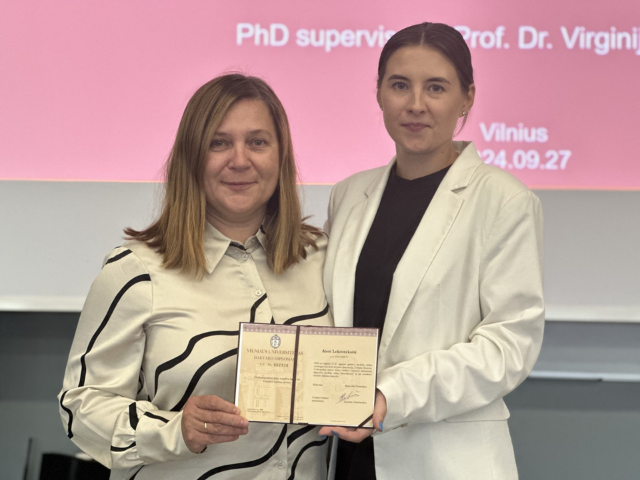Aistė Lekoveckaitė has defended her thesis entitled "Beetles (Insecta, Coleoptera) in the Second Decay Stage of the Most Common Lithuanian Deciduos Tree Species" for the degree of Doctor of Science in Zoology.
The scientific supervisor is Prof. Dr. Virginija Podėnienė.
Composition of the Dissertation Defense Board:
Chairperson - Prof. Dr. Kęstutis Arbačiauskas (Nature Research Centre, Natural Sciences, Ecology and Environmental Sciences);
Assoc. Prof. Dr. Laima Blažytė-Čereškienė (Nature Research Centre, Natural Sciences, Biology);
Prof. Dr. Olavi Kurina (Estonian University of Life Sciences, Tartu, Estonia, Natural Sciences, Zoology);
Dr. Norbertas Noreika (Nature Research Centre, Natural Sciences, Biology);
Prof. Dr. Virginijus Sruoga (Vilnius University, Natural Sciences, Zoology).
In Lithuania, forests cover about one-third of the country's territory, and dead wood is an integral part. It is increasingly recognized as a key element of the naturalness of forest ecosystems, which is essential to slow or halt biodiversity loss.
Species dependent on decaying or dead wood at any life cycle stage are called saproxylic. Insects are one of the main groups of saproxylic organisms, with beetles (order Coleoptera) being the most diverse. By using dead wood and the micro-habitats it creates as a food source, feeding, developmental, or overwintering site, beetles contribute to the decomposition of dead wood and the cycling of nutrients in forest ecosystems.
Habitat heterogeneity is a key factor in determining the diversity of beetles associated with dead wood. It can be increased indirectly by increasing the amount of dead wood or directly using dead wood with different characteristics. Deforestation, tree loss, and insufficient quantities of sizeable dead wood (fallen dead wood) in forests threaten saproxylic beetle populations across Europe, including Lithuania. Therefore, research on these organisms and the development of information on their biology and ecology is of great importance.
This work is the first extended study in Lithuania to analyze beetle communities in the second decay stage (slightly decayed wood covered by bark) of deciduous fallen dead wood.

